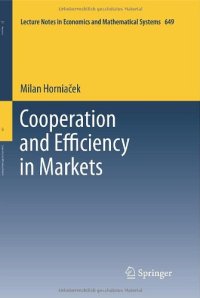
Ebook: Cooperation and efficiency in markets
Author: Milan Horniacek (auth.)
- Tags: Game Theory/Mathematical Methods, Industrial Organization, Economic Policy, Economic Theory, Microeconomics, Game Theory Economics Social and Behav. Sciences
- Series: Lecture Notes in Economics and Mathematical Systems 649
- Year: 2011
- Publisher: Springer-Verlag Berlin Heidelberg
- Edition: 1
- Language: English
- pdf
The book deals with collusion between firms on both sides of a market that is immune to deviations by coalitions. We study this issue using an infinitely countably repeated game with discounting of future single period payoffs. A strict strong perfect equilibrium is the main solution concept that we apply. It requires that no coalition of players in no subgame can weakly Pareto improve the vector of continuation average discounted payoffs of its members by a deviation. If the sum of firms' average discounted profits is maximized along the equilibrium path then the equilibrium output of each type of good is produced with the lowest possible costs. If, in addition, all buyers are retailers (i.e., they resell the goods purchased in the analyzed market in a retail market) then the equilibrium vector of the quantities sold in the retail market is sold with the lowest possible selling costs. We specify sufficient conditions under which collusion increases consumer welfare.
The book deals with collusion between firms on both sides of a market that is immune to deviations by coalitions. We study this issue using an infinitely countably repeated game with discounting of future single period payoffs. A strict strong perfect equilibrium is the main solution concept that we apply. It requires that no coalition of players in no subgame can weakly Pareto improve the vector of continuation average discounted payoffs of its members by a deviation. If the sum of firms' average discounted profits is maximized along the equilibrium path then the equilibrium output of each type of good is produced with the lowest possible costs. If, in addition, all buyers are retailers (i.e., they resell the goods purchased in the analyzed market in a retail market) then the equilibrium vector of the quantities sold in the retail market is sold with the lowest possible selling costs. We specify sufficient conditions under which collusion increases consumer welfare.